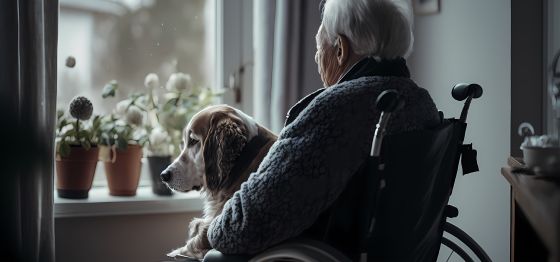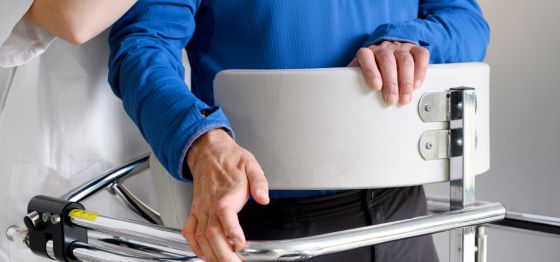Just about everybody gets the blues occasionally. But feeling low all the time is not a typical part of aging. In fact, studies show that most older adults feel satisfied with their lives, even though they have more illnesses or physical problems than younger people.1 Older adults experiencing intense feelings of hopelessness or sadness that don’t go away may be clinically depressed—a disorder that affects an estimated 1 in 15 adults every year.2 Furthermore, late-life depression affects about 6 million Americans ages 65 and older, but only 10% get treatment, most likely because older people often exhibit symptoms of depression differently than younger people. Plus, depression in older people is frequently confused with the effects of multiple illnesses and the medicines used to treat them.3
What is depression?
Depression is a mood disorder and chronic medical condition characterized by feelings of sadness, anxiety, and/or apathy that last for at least 2 weeks and impact a person’s ability to function normally. Depression not only affects the way people feel, but also the way they think and act. In other words, being clinically depressed is different from normal feelings of sadness or grief that accompany the loss of a loved one.4 There are several types of depression that older adults may experience: 5
- Major Depressive Disorder with symptoms lasting at least 2 weeks that interfere with a person’s ability to perform daily tasks.
- Persistent Depressive Disorder (dysthymia) is a depressed mood that lasts more than 2 years, but the person may still be able to perform daily tasks.
- Substance/Medication-Induced Depressive Disorder is related to the use of substances, like alcohol or pain medication.
- Depressive Disorder Due to A Medical Condition may be related to a separate illness, like heart disease or multiple sclerosis.
What are the symptoms of depression in older adults?
There are many ways for the affected older adult or the caregiver to know that depression is the problem they’re facing. A few of the signs and symptoms of depression in the elderly include: 6
- Apathy
- Persistent sadness
- Irritability
- A sense of hopelessness
- Loss of interest in enjoyable activities
- Trouble concentrating
- Insomnia or oversleeping
What are the causes of depression in older adults?
Older adults have a higher risk of developing depression, but there is no single, specific cause.7 Overall, it’s rare for depression to occur for no known reason. Certain factors—which are more likely to be seen later in life—may very likely contribute to depression in seniors.8
- Loneliness
Being isolated from family, friends and the community can quickly lead to depression.9 This is more likely in a senior who has lost a spouse, lives far away from family, or is physically debilitated and unable to go out and interact with people.
- Grief
The death of a spouse, a friend or even a pet may lead to depression among seniors.10 A breakdown in a relationship, such as a divorce after many years of marriage, may also cause grief and contribute to an elderly person’s depression.
- Illness
Approximately 80% of older adults have at least 1 chronic condition.11 Depression may accompany these conditions, either as a direct impact of the disease or as a complication, like pain or loss of mobility.
- Medication
Side effects of prescription medications may also be a major contributing factor to depression among the elderly, who are more likely to be taking drugs over the long term.12 Though essential, these drugs may also contribute to depression.
- Fear
For the elderly, fears often revolve around illness, death, loneliness or economic difficulties.13 There are also certain factors and situations that are more likely to be faced by an older person, which could easily contribute to depression.
What are the most effective treatments for depression in older adults?
There’s no one-size-fits-all treatment for depression in older adults,14 but treatment approaches may include:
- Psychotherapy or counseling
Often called talk therapy, it can help a person identify and change troubling emotions, thoughts and behavior. Psychotherapy may be done with a psychologist, licensed clinical social worker, psychiatrist or other licensed mental health care professional.
- Antidepressant medications
These may help balance hormones that affect mood. Selective serotonin reuptake inhibitors (SSRIs) are antidepressants commonly recommended for older adults. A psychiatrist or primary care physician can prescribe and help monitor medications and potential side effects.15
- Electroconvulsive therapy (ECT)
Electrodes are placed on the elderly patient’s head, enabling a safe, mild electric current to pass through the brain. This type of therapy is usually considered only if a senior’s illness has not improved with other treatments.
- Repetitive transcranial magnetic stimulation (rTMS)
This treatment uses magnets to activate the brain. rTMS does not require anesthesia and targets only specific regions of the brain to help reduce side effects such as fatigue, nausea, or memory loss that could happen with ECT.16
How can seniors and their caregivers protect against depression in older adults?17
- Get enough sleep
Lack of sleep can cause depressed feelings as well as irritability. Older adults may benefit from 7 to 9 hours of sleep each night.
- Stay active
Exercise helps improve the mood of older adults. Brisk walking, swimming and light yard work are all great activity choices.
- Be social
Older adults should try to stay in touch with friends and family. Volunteering is also a great way to get involved and meet new people.
- Eat right
Good nutrition can help older adults have more energy and prevent medical conditions that may indirectly increase the risk of depression.
By staying informed and in touch, older adults and their loved ones may be better able to recognize the symptoms of depression and access necessary treatment.18
Go365 by Humana® makes wellness fun and easy. We help Humana Medicare members with Go365® on their plan reach health goals, as well as take care of their physical and emotional health—allowing members to thrive at any age.
Humana Medicare members with Go365 on their plan can enroll in Go365 at
Go365 is a well-being and rewards program for many Humana Medicare Advantage members. Rewards have no cash value and can only be redeemed in the Go365 Mall. Rewards must be earned and redeemed within the same plan year. Any rewards not redeemed by December 31st will be forfeited.
If you need to enroll in Medicare Advantage or change your plan outside of the usual Medicare Annual Election Period, a Special Election Period (SEP) could be the answer. For information on eligibility, visit Humana’s
To learn more about Humana Medicare Advantage, call to speak with a licensed Humana sales agent at 1-844-321-5843 (TTY:711), Monday – Friday, 8 a.m. – 8 p.m. local time or visit
Sources:
1“Depression and Older Adults,” National Institute on Aging, last accessed February 10, 2023,
2“What Is Depression?,” American Psychiatric Association, last accessed February 10, 2023,
3Debra Fulghum Bruce, “Depression in Older People,” WebMD, last accessed February 10, 2023,
4“How Common is Depression in Older Adults?,” National Council on Aging, last accessed February 10, 2023,
5“Depression and Older Adults”
6“How Common is Depression in Older Adults?”
7“How Common is Depression in Older Adults?”
8“How Common is Depression in Older Adults?”
9“How Common is Depression in Older Adults?”
10“How Common is Depression in Older Adults?”
11“How Common is Depression in Older Adults?”
12Bruce, “Depression in Older People.”
13“Percent of U.S. Adults 55 and Over with Chronic Conditions,” National Center for Health Statistics, last accessed February 10, 2023,
14Bruce, “Depression in Older People.”
15Bruce, “Depression in Older People.”
16“How Common is Depression in Older Adults?”
17“How Common is Depression in Older Adults?”
18“How Common is Depression in Older Adults?”
This information is provided for educational purposes only. It is not to be used for medical advice, diagnosis or treatment. Consult your healthcare provider if you have questions or concerns.
Go365 is not an insurance product and is not available with all Humana health plans. This is a general description of services which are subject to change. Product features may vary by client. Please refer to Customer Support for more information.
Humana is a Medicare Advantage HMO, PPO and PFFS organization with a Medicare contract. Humana is also a Coordinated Care plan with a Medicare contract and a contract with the state Medicaid program. Enrollment in any Humana plan depends on contract renewal.




)